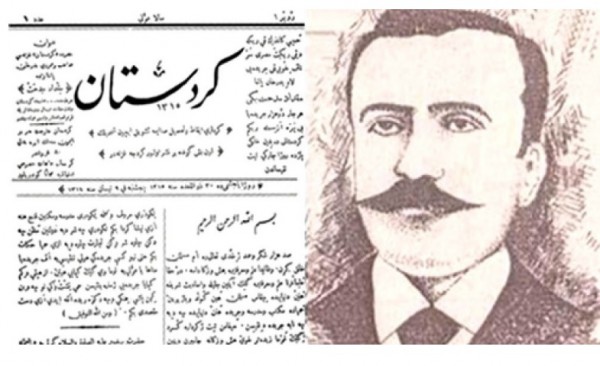On the 123rd anniversary of Kurdish journalism…media in Kurdistan between reality and restricted work
ERBIL, Kurdistan, Iraq (North Press) – Journalists described the reality of Kurdish media in the Kurdistan Region of Iraq (KRG) as miserable despite its legal and theoretical quality. This comes with the passage of more than a century and two decades since the establishment of the first Kurdish newspaper and the emergence of more than 1,400 media outlets in the KRG.
These journalists long for freedom and an independent press, knowing that the region has become a safe place for a large number of Iraqi journalists.
April 22 marks the 123rd anniversary of the founding of the first Kurdish newspaper.
It was founded by the Kurdish prince Meqdad Medhat Bedirkhan, who was the son of the Bedirkhan family, which used to rule Jazira Botan, located in the state of Shirnak in southeastern Turkey.
The first issue of the first Kurdish newspaper, Kurdistan, was published on this day in the year 1898 (22/4), in the diaspora in the Egyptian capital Cairo, in order to ward off any crackdown by the Turkish ruling regime.
This date was considered a special day for the Kurdish press, and is celebrated by Kurdish journalists.
Over the decades and the emergence of technology, many Kurdish written and then audio media institutions were established to enter the visual stage, where hundreds of satellite and local channels now exist.
However, what arouses the cynicism of those working in the media are the restrictions that surround them and the influence of political parties within institutions, and thus the lofty media message is not complete, according to what journalists see.
Karwan Anwar, the captain of the Kurdistan Journalists Syndicate – Sulaymaniyah Branch, told North Press that the media reality in terms of quantity is in good condition.
He revealed the existence of 1,400 licensed media institutions in the KRG.
Pros and Cons
Anwar also described the media reality as good in terms of the law, considering the existence of press law and the law on access to information enacted by the Parliament of the Kurdistan Region.
In practice and on the ground, Anwar said that freedom of expression was fine during the past years, but it started to fade. 2021 is a terrible year for the press, with journalists being prosecuted, punished and imprisoned, according to him.
Anwar mentioned a series of assassinations that affected a number of journalists during the past two decades by unknown parties in KRG, without any accountability for or even idenfification of those responsible.
He held the Journalists Syndicate and the regional authorities fully responsible for the violations against journalists.
Anwar referred to a kind of regionalism regarding the issue of freedom of expression, the right to demonstrate, and freedom of journalism.
“Sulaymaniyah provides a safer environment for this, unlike the Dohuk and Erbil regions,” he said.
“Kurdish media is still in a dire and worsening situation, despite the passage of 123 years since the establishment of the first Kurdish newspaper,” said journalist Azad Ibrahim.
Chaos and partisanship
Ibrahim added to North Press that after the fall of Saddam Hussein’s regime, in Iraq, a large number of media outlets appeared.
“This amount created chaos without organizing it in a way that serves society and sends its humanitarian message,” according to the journalist.
He said that what raises the discontent of those working in the media, as well as the audience, is that the media is subject to the influence of local parties, which move it away from an independent national press.
The Kurdistan Region of Iraq is considered a safe place for journalists and activists who are being threatened and mistreated in other parts of Iraq, according to the journalist Roshan Qasim.
However, KRG’s journalists are often victims of the deteriorating human rights reality in the region.
“The inability to provide adequate protection for journalists and activists in KRG is a result of the raging political conflict and problems between the political forces in power,” Qasim told North Press.
These problems were naturally reflected in the reality of the press and the situation of journalists, according to Qasim.
She expressed regret at the presence of journalists behind bars for exposing corruption or conveying a reality that some parties in the authority do not like, which means a decline in the level of press freedom in the KRG.
The journalist spoke of forms of violations burdening journalists, such as preventing press coverage, arresting people without a warrant, threats and insults, confiscation of equipment, and closure of press institutions.
According to Qasim, this affects the message of the press and journalists in the region, and pushes them to work on entertainment programs or programs that are unable to simulate Kurdish reality, culture, and traditions.
Likewise, the parties’ monopoly over the media has put journalists in front of difficult choices in a dire economic situation that is getting worse in the region, and there is an absence of independent media, meaning that which is not affiliated with a specific political party.
The suffering of female journalists
Qasim focused on another issue related to female journalists and the reality that they face in their journalistic work.
She stressed that there is generally marginalization in dealing with this issue, attributing that to the women’s organizations to defend women journalists, for example, who are subjected to harassment.
“Journalism is a troublesome profession whose challenges multiply when it is practiced by women,” she said.
“If we compare programs that are concerned with fashion, make-up, and hosting fashionistas with serious programs that deal with women’s rights issues, we find that the balance is tilted significantly to the first type of programs that show women as a commodity and depend on presenters who only work because of their outward appearance,” she added.

